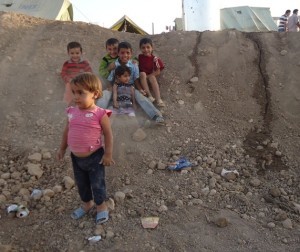Syrian Refugees Head for Iraqi Kurdistan

Muhieddine Isso
The Dumez refugee camp in Iraqi Kurdistan is located on arid land with no trees in sight, ten kilometres from the city of Dohuk.
Most of the camp’s residents are Kurdish families from Syria who have fled from areas that have seen heavy fighting – Damascus and the surrounding countryside, Homs, Aleppo and Hama.
They would have moved to those areas from their original homes in Al-Hassaka region in northeastern Syria. When they returned there, however, they were unable to find accommodation or a way of supporting themselves, so they moved on to Iraqi Kurdistan.
Abdullah, a father of seven, left Shebaa, a Kurdish quarter in Damascus, when it came under artillery fire from government troops.
“When our neighbourhood was shelled, we had to leave for Qamishli [in the northeast] in search of safety. We lost our jobs in Damascus,” Abdullah said. “Unable to find somewhere to live for my family in Qamishli, or to earn a living there, I ended up in Iraqi Kurdistan. We’re having to live in a tent for the time being until it’s safe to go back to Damascus.”
Thousands of Kurds have been displaced by spiraling food prices in Syria and by rumours that reservists are being rounded up in Kurdish-majority areas and sent off to the army. According to the United Nations refugee agency UNHCR, more than 5,000 Syrian refugees fled to Iraqi Kurdistan in August, and there are now nearly 10,000 in the Dumez camp.
Each family has a tent to live in. Some have been allocated supplies like mattresses, fridges and electric fans, while others who arrived more recently have yet to receive anything.
There is dust everywhere and sewage channels run above ground, between the tents. There is one toilet for every ten tents.
The camp has no school, so children spend their time playing outside.
Majid Dawi, an activist who is assisting the UNHCR effort, said, “The poor living conditions in the camp are still cause for criticism, despite attempts by international organisations to provide refugees with what they need. The vast number of refugees fleeing to the camp makes it difficult to deliver all that’s needed.”
Dawi accuses the Kurdistan Regional Government, KRG, in northern Iraq of failing to make adequate provision for the camp. He suspects the KRG is concerned that if conditions at the camp improved, more refugees would come there.
Other Syrian refugees have settled outside the camps, in urban areas like the region’s capital Erbil, Sulaymaniyah, Dohuk and Zakho. They complain about the difficulty of finding work, the high rent and transport costs.
“Living conditions for Syrians in Erbil are no better than in the camp,” Dawi said, adding that it was nearly impossible for them to find affordable accommodation. “This is why many have gone back to Syria, despite what might happen to them.”
The KRG has changed its policy on residence permits. When the Syrian revolution began in 2011, refugees were issued with residence permits on arrival, whether they had come alone or as families. As the numbers increased in 2012, however, the KRG stopped granting residence rights to Syrian nationals. As a result, some have been living in Iraqi Kurdistan without a permit for nearly a year.
In the Dumez camp, many refugees are disappointed with the Syrian Kurdish political parties. They say none of the party leaders had visited the camp.
“Neither the Kurdish parties in Syria nor the Kurdish government here are thinking about us. If the international organisations hadn’t helped us, we would be in a catastrophic situation by now,” Khoshnav Khalil, originally from Qamishli, said. “Many families came from northern Syria seeking security, but ended up sleeping on the streets and unable to find jobs. They’re still waiting for humanitarian aid, and for the regime to fall so that they can return home.”
Bahjat Bishr of the Kurdish National Council in Syria, responded to the criticisms by saying his political group “cannot stop the exodus of refugees from Kurdish areas in Syria, nor does it have the funds to improve conditions for them or provide food aid, because of the large numbers involved”.
A member of the KRG parliament, speaking on condition of anonymity, indicated that there was little political will to make life better for people fleeing from Syria.
“If we improved conditions for the refugees, gave them housing and treated them like Iraqi Kurdish citizens, you wouldn’t find a single Kurd left in Syria,” he said. “All of them would leave the areas they live in because of the poor economic situation, and those areas would be depopulated. We are therefore doing our best to reduce the influx into Iraqi Kurdistan.”
